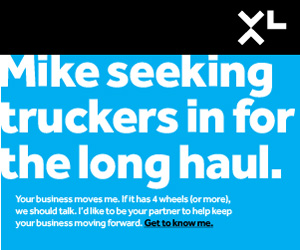Risk Scenario
Black Jacked
Disclaimer: The events depicted in this scenario are fictitious. Any similarity to any corporation or person, living or dead, is merely coincidental.
Part One
Every trucker in the West who liked his eggs done right and his coffee strong looked for the red neon sign with a blinking ace and jack of spades that said you were approaching Black Jack’s. The truck stop on Interstate 90 outside of Missoula, Mont. was where truckers went for a good breakfast, a great steak or at minimum a cup of coffee and some decent company.
So as they headed West late one chilly afternoon in October, Omega Trucking long-haul driver Denny Trainor and his partner Cliff Baron were pinning their hopes on the famous 22-ounce rib-eye steak dinner at Black Jack’s. They made Missoula in good time.
 “You go ahead, man,” Cliff said with a yawn. “I could use another nap before I take the wheel. I’ll stay here with these big screens,” he said with a grin, referring to the state-of-the-art HDTVS which were part of the $2 million load of electronics the pair was transporting.
“You go ahead, man,” Cliff said with a yawn. “I could use another nap before I take the wheel. I’ll stay here with these big screens,” he said with a grin, referring to the state-of-the-art HDTVS which were part of the $2 million load of electronics the pair was transporting.
Denny parked the rig and went in to eat first, leaving Cliff to nod off for a bit in the truck. It was company policy that when two drivers were on a route, one always stayed with the load.
Denny was an eater, and he lingered at the counter over numerous cups of coffee and a slice of key lime pie as the sun went down. There were always stories to be told at Black Jack’s, and Denny liked to tell them as much as anyone.
Walking back to the truck in the dark, Denny felt the cold autumn air and it gave him a chill. As he approached the cab, he could see that Cliff was still sleeping.
Denny stepped up on the running board of the truck to knock on the passenger window. Just as he did, rough hands pulled him down and a sharp blow to the back of his head knocked him out.
***
Rick Erickson, the controller for Omega Trucking, got one of the first calls.
“We lost a load in Montana.” It was his boss, chief of operations Bruce Headings.
“That was the electronics load,” Rick said, voicing what both of them knew. “What happened?”
“Someone knocked out Cliff and Denny and took it. They’re in OK shape, but the truck is long gone.”
Rick went cold. They’d lost another electronics load two years ago. Not as bad as this one though.
“We were sub on that,” Rick continued.
“Right,” Bruce said.
Rick exhaled. This next move was going to hurt.
“I’ll call Royal,” he said flatly, referring to the trucking company that had subcontracted the load to Omega.
Part Two
“You had a $500,000 limit on it, didn’t you?” said Carol Fry, the risk manager for Royal, a company about 10 times the size of Omega.

“Yep and I submitted the claim last night,” Rick said.
“When do you think you’ll know?” she said.
“Hopefully within a week.”
When his broker called him back the very next day, Rick knew he had a problem. In this case, a really quick answer was a bad answer.
“They’re only offering to pay 20 percent of this claim based on the recent electronics loss,” the broker said.
“Is there any …?” Rick began.
“It’s in black and white,” the broker said, referring to an endorsement that had been added to the Omega insurance policy, which stipulated that the insurance carrier was only on the hook for $100,000 of the $500,000 limit as a theft limitation for electronics.
“A hundred thousand?” Carol said to Rick when he called her.
“Did they say why?” she continued.
“We had a previous electronics theft,” Rick said. It was either that or not get renewed. He felt himself going numb.
“That you didn’t tell us about,” Carol said.
Rick didn’t immediately respond.
Carol glanced at her desk at the photo of her eight year old twins dressed in Notre Dame football jerseys. The darkness of what Rick was telling her juxtaposed against the image of her sunlit children brought on low-level nausea.
Carol hung up. The numbers started to flip through her head.
The initial picture was a hundred thousand against a $2 million loss with her own claim yet to be decided on.
“We have a $2,000,000 limit on our insurance policy, which will cover the loss. Well, better a rate increase at renewal than no coverage at all,” she thought to herself.
The telephone rang. It was her broker.
“Hey Carol,” the broker said, and right away Carol knew her problem was bigger than she dared to dream. Her broker’s voice would always go up a note or two when he was under stress and that tone was in his voice now.
“Your claim has been denied,” the broker said.
“Why?” Carol said.
The broker paused to clear his throat. She could hear the plastic lid of what sounded like a bottle of Ibuprofen being unsteadily screwed back on in the background.
Under the circumstances, that slow, distant, grating sound came off like something from a horror movie.
Part Three
“Can I have an answer please?” Carol asked as her broker continued to waffle.

“When we filled out your coverage application, you didn’t mention subcontracted operations,” the broker said.
“The Property Not Covered Clause in the insurance policy negates insurance for freight forwarding or freight contracting operations. If I only had known … I might have been able to get something tacked on,” he said.
“Didn’t you think about it?” she said.
“We were trying to get the best rate we could,” he said very measuredly. “Maybe I got a little distracted.”
Carol took a moment.
She could read between the lines. This wasn’t entirely the broker’s fault.
Royal’s CFO had been very influential in the risk management team’s renewal meetings with the broker.
The CFO, rightly keeping his eye on the bottom line, had talked a lot in those meetings about getting premium rates that were more in line with the softer inland marine market conditions that he had been reading about: Prices that were lower than the carrier’s initial proposal.
That concentration, perhaps at the expense of other concerns, was now having some unintended consequences. The broker might have left those meetings with the idea that rate was paramount, when broader, more comprehensive coverage was equally important.
All this was running through Carol’s head when the broker brought her back to the present moment.
“Are you still there?” the broker said.
“Yes, I’m still here,” Carol said.
“But I don’t know for how much longer,” she said after she hung up the phone.
Carol looked down at the cover of the insurance trade magazine on her desk.
“How stupid could we have been?” she said.
About $4.75 million worth of stupid as it turned out.
Bright Star, the electronics shipper, took Royal to court and won, collecting $2 million for the lost load and an additional $500,000 under a contract penalty clause.
Royal also lost $2.25 million in revenue when Bright Star used another clause in its contract to sever its relationship with the trucking company, chopping three years at $750,000 per year off of a four-year contract.
And who could put a number on the reputational damage? The robbery had made the local TV news and newspapers. Not only that, the story went national when it was featured as part of an investigative crime report in Trucker Magazine.
Royal didn’t even bother suing Omega or its broker. Due to the coverage oversight their legal position was weak. Tacking dozens of hours of legal fees on top of all of this was not something Royal’s C-level people had the stomach for.
That spring at Black Jack’s, the lunch counter topic of conversation turned to the layoffs at Royal Trucking.
“Heard it was about insurance or something,” a beefy trucker from Morgantown, W. Va. said to Denny Trainor as Denny wolfed down a Black Jack’s barbecue turkey club loaded with Serrano pepper mayonnaise and Vidalia onion rings.
“I don’t know nothin’ about that kind of stuff,” Denny said.
“I just drive.”
Risk & Insurance partnered with XL Catlin to produce this scenario. Below are XL Catlin’s recommendations on how to prevent the losses presented in the scenario. These lessons learned are not the editorial opinion of Risk & Insurance.
Freight forwarding and freight brokering arrangements create numerous risk exposures if not handled effectively.
Truckers need to determine whether the trucking companies they subcontract with or broker out loads have theft limitations on their policies. For their part, shippers will want to determine whether the trucking companies they are working with subcontract operations. If they do, the shipper should insist on being able to review those subcontractors and their loss histories.
Contract penalty clauses in shipping contracts have the potential to inflict heavy penalties. Trucking companies would be well-advised to seek out contract penalty coverage where available. Transportation companies should also review transportation broker-shipping contracts to determine the extent of and triggers for contract penalties.
In freight forwarding and freight brokering arrangements, trucking companies should strongly consider buying contingent motor truck cargo insurance that covers subcontractors as an endorsement to their motor cargo policy.
Taking the time to research and know their business partners and the extent of their coverage will help transportation risk managers and their insurance brokers to determine the adequate amount of coverage they should carry.
Contingent coverage: In freight forwarding and freight brokering arrangements, trucking companies should strongly consider contingent motor truck cargo insurance, which typically is an endorsement to a motor truck cargo policy.
Contract penalty coverage: Not every carrier offers it, but some do. This coverage will protect the interests of a trucker in the event they cannot fulfill their contractual obligation in the event of a covered loss.
Review subcontractor’s policies: Trucking companies that contract with subcontractors should review the subcontractor’s policies for any limits that could create exposures for the primary transport company.
Review truck broker-shipper agreements: Reviewing these agreements is especially important to determine the terms of any contract penalty clauses.
Theft limitations: Trucking subcontractors should document their loss histories and review their insurance policy for theft limitations that could be in place.
Driver controls: Trucking companies and subcontractors should put in place driver controls to prevent thefts.
Subcontracting: Shippers should determine whether the trucking companies they work with subcontract loads.
Screen subcontractors: If it’s determined that trucking companies do subcontract, the shipper should investigate those companies and their loss histories.












